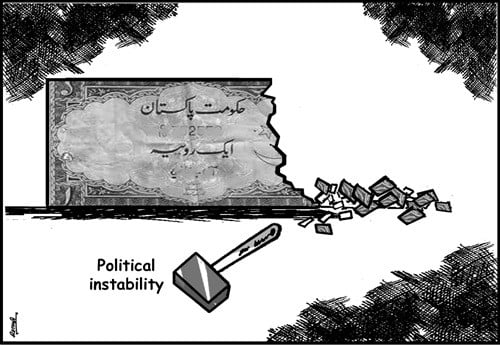
Pakistan’s financial health can’t afford politics at the cost of economy

The national economy has reportedly incurred a loss of Rs800 billion due to the Azadi march led by Pakistan Tehreek-e-Insaf chief Imran Khan and Inqilab march led by Pakistan Awami Tehreek chief Dr Tahirul Qadri, which kept the nation hostage for weeks and stimulated the political atmosphere of the country, pressuring Prime Minister Nawaz Sharif to resign. The cost may increase if the deadlock persists.
The prime minister and the hawks of his ruling Pakistan Muslim League-N may not have remotely ideated that the demand for recounting just in four constituencies would gradually pick up momentum and would turn into a snowball. The matter is mishandled by his party as usual. With regard to Qadri’s march, the Punjab government has itself provided him an opportunity of protest by killing 14 people and injuring over a 100 others of the PAT activists in Model Town, Lahore without realising that the politics is the name of accommodation of conflicting and opposite views.
The matter was gravely mishandled by the provincial government which not only cost the chief minister’s reputation as a good administrator, but also as a good human being. Qadri, who was nowhere in sight on the political horizon, has been made a stakeholder overnight and he has stretched his demand from the resignation of the two Sharifs to their death penalty.
There are heated discussions on TV channels for and against the marches and political pundits are predicting various options for the government and the opposition to end the political impasse. However, marches may have positive or negative impact on the country’s political system, but one thing is clear that the politics of confrontation has adversely affected the national economy. The twin cities of Islamabad and Rawalpindi are already facing shortage of food items while the political tension has brought the economic and trade activities in almost all the business centres of the country to a standstill.
The unfortunate aspect of the whole state of affairs is that no one on the political divide is ready to budge from his position. The two protesting parties are not in a hurry to finish the episode while the government is also not in a haste either, leading the situation toward a cliffhanger ending. If firebrand cleric Qadri and enthusiastic Imran Khan are keeping the fervour alive in their respective followers by warm speeches, the government aides are also issuing fiery statements adding insult to injury.
Khan has given a call for civil disobedience to his followers which has made a big dent in his political reputation and career. The former skipper should have known that there is a difference between the government and the state. The governments come and go, but the state remains intact and it needs money to run its administrative affairs. Following Khan’s statement, his fans living abroad have stopped sending their remittances, strengthening dollar against the weak Pakistani rupee in the country.
The domestic situation has also marginalised the country in the foreign affairs’ domain. The Sri Lankan president has cancelled his scheduled visit to Islamabad while India has cancelled the much-delayed secretary-level talks scheduled to be held on August 25 without assigning a reason.
On another note, the political chaos is costing heavily to the national economy. The rupee value is already dwindling and has crossed the psychological barrier of Rs100 a dollar and the foreign reserves in the State Bank of Pakistan have touched $9 billion low. In this situation, the economy of Pakistan is facing tremendous pressure. The government has impounded thousands of trailers to use as barricades, but its negative effect is that the exporters -- who were sending their consignments abroad -- have failed to fulfill their obligations, bringing a bad name not only to the exporters, but also to the country. The road blockades have also curtailed commercial activities in various cities.
Khurram Dastgir Khan, the federal minister for commerce, has warned that the country’s economy cannot withstand further pressure as the people from all walks of life, including traders, businessmen, and industrialists are extremely worried about the current political situation in the country. Finance Minister Ishaq Dar has also expressed similar views about the losses to the national economy, but the fact remains the politicians have their own priorities and economy always remained an insignificance issue for them.
"Both the government and the protesting parties are dilly-dallying constructive talks," says Fakhar Malik, an economist. He says that the political chaos costing heavily on the national economy and sooner the problem is resolved the better.
"When you just talk and do not listen, things will not move forward," says an official of the Lahore Chambers of Commerce and Industry, requesting anonymity. He adds that doors should always remain open in politics and both the government and the opposition should have shown flexibility. "Imran Khan should not have given a call for civil disobedience," he said, adding that his call has given a severe blow to the economy.
Rehmat Ali, who trades in electronic goods, says that his import bill will be severely affected if dollar price goes up. He adds that the government must take immediate steps to stop devaluation of Pak rupee. "It is the collective responsibility of the politicians to keep the national interests supreme," he said, adding that business and trade are the basic elements in the western democracies. He adds that many countries, where democracy is even restricted, are making progress thanks to decisions taken by their prudent leaders.